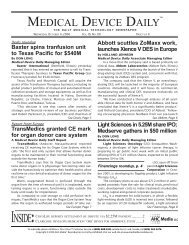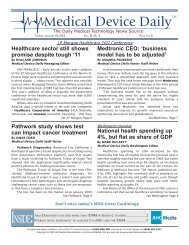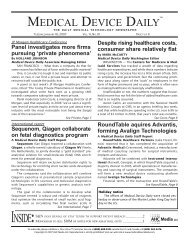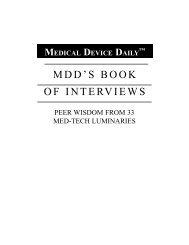MEDICAL DEVICE INNOVATION - Medical Device Daily
MEDICAL DEVICE INNOVATION - Medical Device Daily
MEDICAL DEVICE INNOVATION - Medical Device Daily
You also want an ePaper? Increase the reach of your titles
YUMPU automatically turns print PDFs into web optimized ePapers that Google loves.
74<br />
LenSar developing laser<br />
technology for cataracts<br />
By AMANDA PEDERSEN<br />
<strong>Medical</strong> <strong>Device</strong> <strong>Daily</strong> Staff Writer<br />
LenSar (New York), a startup company, says it is developing<br />
a new laser therapy that could potentially remove<br />
cataracts from people’s eyes more efficiently and with<br />
greater precision than the current technology used to treat<br />
cataracts. The company presented the technology at the<br />
recent American Academy of Ophthalmology (San<br />
Francisco) meeting.<br />
Joseph Dello Russo, MD, a New York ophthalmologist<br />
who was among the first doctors to perform laser eye surgery,<br />
told <strong>Medical</strong> <strong>Device</strong> <strong>Daily</strong> that he has watched<br />
LenSar’s technology develop from a concept in 2004 to an<br />
actual laser, which the company began testing on patients<br />
in Mexico about a year and a half ago. More recently, the<br />
company began testing the laser on patients in the<br />
Philippines, he said.<br />
Russo has been affiliated with LenSar since its inception<br />
and up until about six months ago was on the company’s<br />
board.<br />
LenSar plans to continue testing human patients outside<br />
the U.S. until it has collected enough data to support<br />
that the technology actually works, Russo said. The company<br />
said it plans to start treating patients in the U.S. if the<br />
FDA will consider the technology to be safe an effective,<br />
based on the data.<br />
Cataracts are currently treated with a device known as<br />
a Phacoemulsifier, which uses ultrasound waves to break<br />
up the contents of the cataract and, according to LenSar,<br />
was nicknamed in the mid-seventies a “laser.”<br />
“People think of it as a laser, which it’s not,” Russo said.<br />
While the current technology is generally considered very<br />
safe, he said that results largely depend on the skill of the<br />
surgeon doing the procedure.<br />
LenSar believes that its laser will make cataract surgery<br />
easier to perform. Although the new device will cost more<br />
than the existing technology, LenSar says the speed of surgery<br />
may compensate for that by allowing more procedures<br />
to be performed in less time.<br />
Russo explained that the new laser technology has the<br />
potential to allow for the use of premium implants, which<br />
set up bifocal vision as well as provide a better way to treat<br />
astigmatism. Such implants, Russo said, work best if they<br />
are implanted exactly in the center of the eye, which will<br />
depend upon the perfection of the capsulotomy – the incision<br />
into the crystalline lens of the eye to remove cataracts<br />
– which is currently done by hand. “Most of us can do that<br />
pretty good, but there’s nothing like a laser that can do it<br />
precise[ly],” he said.<br />
Improved precision would also make the procedure<br />
safer, Russo said. “It’s taking the surgeon out somewhat<br />
<strong>MEDICAL</strong> <strong>DEVICE</strong> <strong>INNOVATION</strong> 2010<br />
and making the laser do the work so it can be consistent all<br />
the time.”<br />
But only time – and more clinical testing – will tell if<br />
LenSar’s new laser technology will work. So far though,<br />
Russo says the results look promising. According to LenSar,<br />
the laser has been used in about 100 operations outside the<br />
U.S.<br />
The company was formed by LenSar’s CEO, Randy Frey,<br />
PhD, a scientist best known for the LASIK laser he developed,<br />
according to the company.<br />
LenSar acknowledged that it is in a head-to-head competition<br />
to be the first to commercialize the laser technology.<br />
However, Frey claims that he holds important patent<br />
applications, which allow the company to focus on R&D and<br />
pay less attention to competitors. He believes that LenSar’s<br />
patents will prevail and will have a legal claim on any such<br />
devices, regardless of their maker.<br />
Russo told MDD that he suspects that LenSar’s<br />
strongest competitor is a company called LenSx Lasers<br />
(Aliso Viejo, California). “Either LenSx or LenSar is going to<br />
be first,” he said, adding, “I’m not sure it’s important to be<br />
first or not.”<br />
According to LenSar, the real financial benefit for the<br />
company is not in the sale of the laser but in the “royaltylike”<br />
fee that is paid to the company each time the laser is<br />
used.<br />
(This story originally appeared in the Nov. 6, 2009, edition<br />
of <strong>Medical</strong> <strong>Device</strong> <strong>Daily</strong>)<br />
To subscribe, please call <strong>MEDICAL</strong> <strong>DEVICE</strong> DAILY Customer Service at (800) 888-3912; outside the U.S. and Canada, call (404) 262-5547.<br />
Copyright © 2010 AHC Media LLC. Reproduction is strictly prohibited.
















